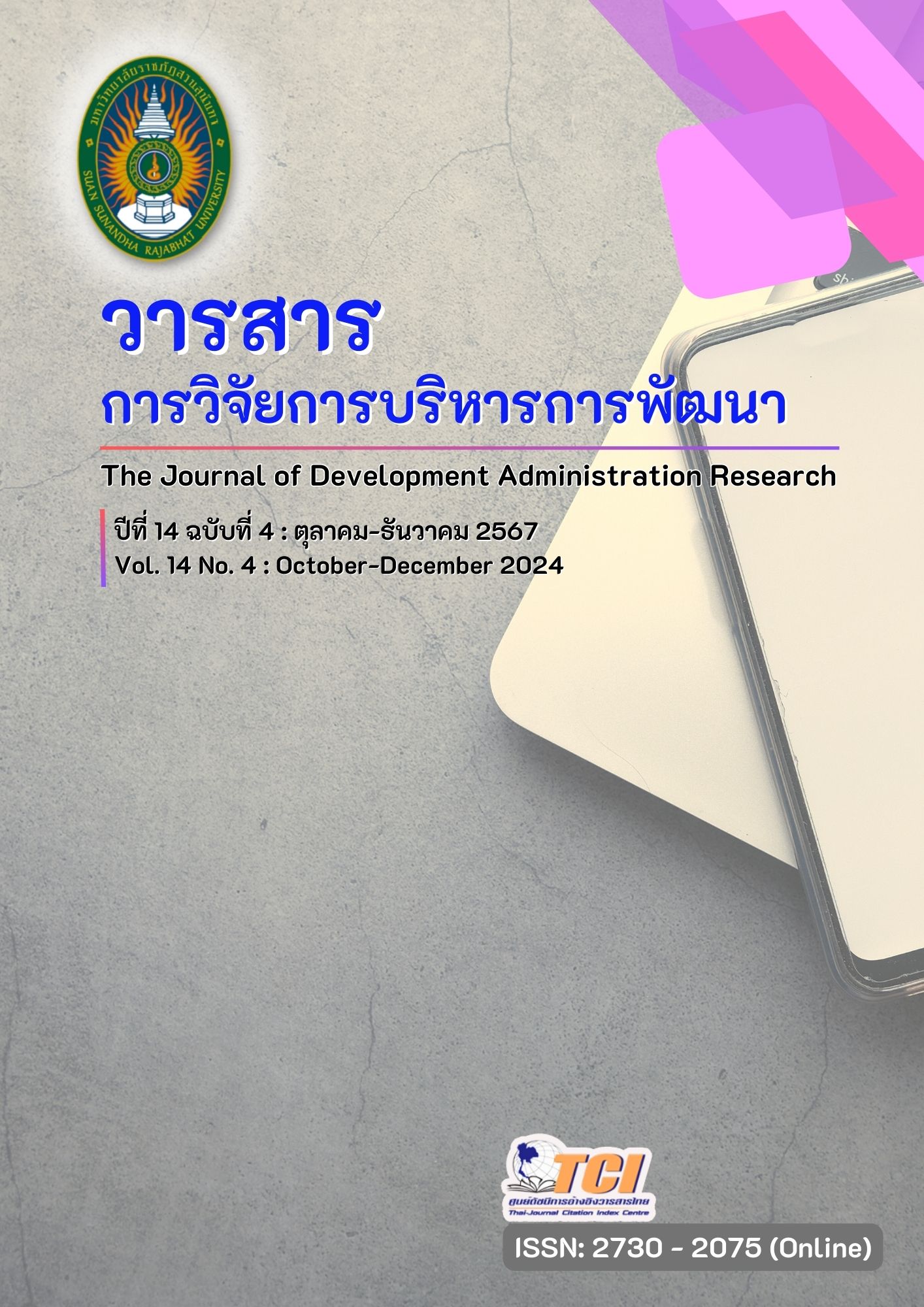Decision-making Logic, Business Model Innovation on Enterprise Performance of Digital Transformation Enterprises in Environmental Uncertainty
คำสำคัญ:
Decision-Making Logic, Business Model Innovation, Enterprise Performance, Digital Transformation, Environmental Uncertaintyบทคัดย่อ
This study aimed to analyze 1) the direct influence of decision-making logic (causation and effectuation) on business model innovation 2) the direct influence of decision-making logic (causation and effectuation) on enterprise performance 3) the direct influence of business model innovation on enterprise performance and 4) the moderating role of environmental uncertainty on decision-making logic (causation and effectuation) and business model innovation. Research methodology were quantitative method, total sample size 454 furniture manufacturing enterprises in Guangzhou, Guangdong Province, collected data by online survey. PLS-SEM was used to evaluate the reflective and structural models to test the hypotheses.
Research results 1) causation and effectuation not only have a direct positive impact on enterprise performance, but also can have a positive impact on enterprise performance by influencing business model innovation. Business model innovation plays a role as a "connector" between decision-making logic and enterprise performance 2) the impact of causation on enterprise performance (β=0.355, p<0.01) is slightly greater than that of effectuation (β=0.321, p<0.01) 3) the impact of effectuation on business model innovation (β=0.317, p<0.01) is greater than that of causation (β=0.181, p<0.01) and 4) Environmental uncertainty negatively regulates causation and business model innovation (β=-0.142, p<0.01), but positively regulates effectuation and business model innovation (β=-0.214, p<0.01). This study not only enriches the research on decision-making logic outcome variables, but also enriches the research on antecedent variables of enterprise performance, and clarifies the influence degree of causation and effectuation. By understanding these relationships, enterprises can choose wise decision-making logic based on their actual situation to enhance their core competitiveness, improve their performance, and achieve sustainable development.
เอกสารอ้างอิง
Akbar, M., Rashid, A. & Sheikh, M. R. (2024). Socioeconomic Determinants of Genetic Disorder in Disabled Persons of Punjab, Pakistan. Bulletin of Business and Economics (BBE), 13(1), 29-41.
Ancillai, C., et al. (2023). Digital technology and business model innovation: A systematic literature review and future research agenda. Technological Forecasting and Social Change, 188, 122307.
Baghersad, V., Davari, A. & Farrokhmanesh, T. (2022). Effectuation, Causation and the Performance of Entrepreneurial Businesses. Management Research in Iran, 26(1), 88-110.
Bentler, P. M. & Chou, C. P. (1987). Practical issues in structural modeling. Sociological methods & research, 16(1), 78-117.
Chandler, G. N., et al. (2011). Causation and effectuation processes: A validation study. Journal of business venturing, 26(3), 375-390.
Chen, J. X., et al. (2019). Demystifying the impact of CEO transformational leadership on firm performance: Interactive roles of exploratory innovation and environmental uncertainty. Journal of Business Research, 96, 85-96.
Chen, J. & Liu, L. (2022). Effectuation, SME service innovation, and business customers’ value perception. The Service Industries Journal, 44(15-16), 1-36.
Chen, Y., Liu, H. & Chen, M. (2022). Achieving novelty and efficiency in business model design: Striking a balance between IT exploration and exploitation. Information & Management, 59(3), 103268.
Chen, Y., et al. (2021). On the road to digital servitization–The (dis) continuous interplay between business model and digital technology. International Journal of Operations & Production Management, 41(5), 694-722.
Chetty, S., Martín, O. M., & Bai, W. (2024). Causal foreign market selection and effectual entry decision-making: The mediating role of collaboration to enhance international performance. Journal of Business Research, 172, 114385.
Click, N. A. (2023). Understanding the Effects of Decision-Making Logics on Small Business Relative Profitability (Doctoral dissertation). The University of North Carolina at Charlotte.
Codini, A. P., Abbate, T. & Petruzzelli, A. M. (2023). Business Model Innovation and exaptation: A new way of innovating in SMEs. Technovation, 119, 102548.
Dağıdır, B. D., & Özkan, B. (2024). A comprehensive evaluation of a company performance using sustainability balanced scorecard based on picture fuzzy AHP. Journal of Cleaner Production, 435, 140519.
Dong, Y., Feng, T.& Sheng, H. (2024). Digital-based business model design and firm performance: the mediating role of ambidextrous innovation. Journal of Business & Industrial Marketing, 39(11), 2309-2324.
Drnevich, P.L. & West, J. (2023). Performance implications of technological uncertainty, age, and size for small businesses. Journal of Small Business Management, 61(4), 1806-1841.
Essen, A., Frishammar, J. & Cenamor, J. (2023). Entering non-platformized sectors: The co-evolution of legitimacy debates and platform business models in digital health care. Technovation, 121, 102597.
Fernandes, S.D.C. & Rozenfeld, H. (2024). Business model innovation through the design of circular product‐service system value propositions: A method proposal. Business Strategy and the Environment, 33(6), 5325-5345.
Filatrovi, E. W., Darmastuti, I. & Srivastava, A. (2024). How to Business Model Innovation Bridges the Gap Between Digital Transformation and Performance?. International Business and Accounting Research Journal, 8(1), 51-65.
Gilbers, M. A. (2024). Causation versus Effectuation: Exploring the Impact of Educational Background on Entrepreneurial Decision-Making Strategies (Master’s Thesis, Business Administration). University of Twente.
Griffin, M. A. & Grote, G. (2020). When is more uncertainty better? A model of uncertainty regulation and effectiveness. Academy of Management Review, 45(4), 745-765.
Guo, J. C. (2023, August 17). Report on the Development of China's Digital Economy Industry (2023). Retrieved March 1, 2024, from https://jg-static.eeo.com.cn/article/info?id=13696 b50f251282ac844ea1f4635e363&channelUuid=undefined
Haftor, D. M. & Costa, R. C. (2023). Five dimensions of business model innovation: A multi-case exploration of industrial incumbent firm’s business model transformations. Journal of Business Research, 154, 113352.
Hair, J., et al. (2022). A primer on partial least squares structural equation modeling (PLS-SEM) (3rd ed.). Thousand Oaks: Sage.
Harms, R., et al. (2021). Effectuation and causation configurations for business model innovation: Addressing COVID-19 in the gastronomy industry. International Journal of Hospitality Management, 95, 102896.
Hristov, I., et al. (2024). A system dynamics approach to the balanced scorecard: a review and dynamic strategy map for operations management. Journal of Manufacturing Technology Management,35(4), 705-743.
Imjai, N., Aujirapongpan, S. & Yaacob, Z. (2024). Impact of logical thinking skills and digital literacy on Thailand's generation Z accounting students’ internship effectiveness: Role of self-learning capability. International Journal of Educational Research Open, 6, 100329.
Jaiswal, V. & Thaker, K. (2024). Studying research in balanced scorecard over the years in performance management systems: a bibliometric analysis. International journal of productivity and performance management, 73(8), 2558-2582.
Jean, R.J.B., et al. (2024). The effect of business model innovation on SMEs’ international performance: The contingent roles of foreign institutional voids and entrepreneurial orientation. Journal of Business Research, 175, 114449.
Jia, R. & Shen, X. (2024). Research on the Impact of Business Model Innovation on Enterprise Performance Based on SPSS Multivariate Linear Regression Analysis. In Economic Management and Big Data Application: Proceedings of the 3rd International Conference (pp. 792-800).
Kamble, S., et al. (2023). An effectuation and causation perspective on the role of design thinking practices and digital capabilities in platform-based ventures. Technological Forecasting and Social Change, 193, 122646.
Karami, M. & Hossain, M. (2024). Marketing intelligence and small firms' performance: the role of entrepreneurial alertness and effectuation. Marketing Intelligence & Planning, 42(1), 168-189.
Khan, T. H., et al. (2024). Responsive to Proactive Market Orientations: Unleashing the Potential of Effectuation-Causation Blending for Business Model Innovation. IEEE Transactions on Engineering Management, 71, 14307-14325.
Koguta, C. S., de Mello, R. D. C. & Skorupskib, R. (2023). Combining effectuation and causation approaches in entrepreneurship: A 20+ years review. REGEPE Entrepreneurship and Small Business Journal, 12(3), 1-12.
Lissillour, R., et al. (2024). Value network and firm performance: the role of knowledge distance and environmental uncertainty. Journal of Knowledge Management, 28(1), 44-68.
Meng, B. (2024). The Key Research of Enterprise Performance Evaluation System Based on EVA Comprehensive Balanced Scorecard. In Economic Management and Big Data Application: Proceedings of the 3rd International Conference (pp. 376-383).
Palacios-Marqués, D., et al. (2019). Social entrepreneurship and organizational performance: A study of the mediating role of distinctive competencies in marketing. Journal of Business Research, 101, 426-432.
Pater, R. (2024). Exploring the Impact of Age on Decision-Making Approaches: a study of causation and effectuation (Bachelor's thesis), University of Twente.
Pathak, B., Ashok, M. & Leng Tan, Y. (2022). Value co-creation in the B2B context: a conceptual framework and its implications. The Service Industries Journal, 42(3-4), 178-205.
Peng, X. B., et al. (2020). The nonlinear effect of effectuation and causation on new venture performance: The moderating effect of environmental uncertainty. Journal of Business Research, 117, 112-123.
Prashantham, S., et al. (2019). Effectuation, network-building and internationalization speed. International Small Business Journal, 37(1), 3-21.
Racat, M., Ricard, A. & Mauer, R. (2024). Effectuation and causation models: an integrative theoretical framework. Small Business Economics, 62(3), 879-893.
Ryman, J.A. & Roach, D. C. (2024). Innovation, effectuation, and uncertainty. Innovation, 26(2), 328-348.
Salfore, N., Ensermu, M. & Kinde, Z. (2023). Business model innovation and firm performance: Evidence from manufacturing SMEs. Heliyon, 9(6), e16384.
Shirokova, G., et al. (2020). Navigating the emerging market context: Performance implications of effectuation and causation for small and medium enterprises during adverse economic conditions in Russia. Strategic Entrepreneurship Journal, 14(3), 470-500.
Singh, S.K., et al. (2021). Top management knowledge value, knowledge sharing practices, open innovation and organizational performance. Journal of Business Research, 128, 788-798.
Spieth, P. & Schneider, S. (2016). Business model innovativeness: designing a formative measure for business model innovation. Journal of business Economics, 86(6), 671-696.
Su, X. H., et al. (2018). Entrepreneurship for money or happiness? An exploring research of entrepreneurial motives, decision-making logic and entrepreneurial performance. Sci Sci Manag S & T, 2, 116-129.
Wang, Z., et al. (2023). Digitalization effect on business performance: role of business model innovation. Sustainability, 15(11), 9020.
White, J.V., et al. (2022). Exploring the boundaries of business model innovation and firm performance: A meta-analysis. Long Range Planning, 55(5), 102242.
Wu, L., Liu, H. & Su, K. (2020). Exploring the dual effect of effectuation on new product development speed and quality. Journal of Business Research, 106, 82-93.
Xu, S., et al. (2022). Entrepreneurial networks, effectuation and business model innovation of startups: The moderating role of environmental dynamism. Creativity and Innovation Management, 31(3), 460-478.
Xu, W. & Liu, C. (2024). External environment uncertainty key resources acquisition and corporate technological innovation. Managerial and Decision Economics, 45(1), 4-18.
Xu, Y., et al. (2024). How does the combination of factors influence entrepreneurs’ decision-making logic? A qualitative comparative analysis. Entrepreneurship Research Journal, 14(3), 1461-1484.
Yamane, T. (1967). Statistics: An introductory analysis. New York: HarperCollins Publishers.
Yıldız, N. T., Alkan, A. & Külünkoğlu, B. A. (2024). Validity and reliability of the Turkish version of mandibular function impairment questionnaire. CRANIO®, 42(2), 160-170.
Yoon, J. H. & Cho, E. (2023). Effectuation (EF) and causation (CS) on venture performance and entrepreneurs’ dispositions affecting the reliance on EF and CS. Entrepreneurship Research Journal, 13(2), 381-408.
Yu, F. & Wang, G. (2023). Assessing the Impact of Business Model Innovation on Firm Performance: Insights from the China Growth Enterprise Market. International Business Research, 16(4), 1-51.
ดาวน์โหลด
เผยแพร่แล้ว
รูปแบบการอ้างอิง
ฉบับ
ประเภทบทความ
สัญญาอนุญาต
ลิขสิทธิ์ (c) 2024 วารสารการวิจัยการบริหารการพัฒนา

อนุญาตภายใต้เงื่อนไข Creative Commons Attribution-NonCommercial-NoDerivatives 4.0 International License.
บทความที่ได้รับการตีพิมพ์เป็นลิขสิทธิ์ของมหาวิทยาลัยราชภัฏสวนสุนันทา
ข้อความที่ปรากฏในบทความแต่ละเรื่องในวารสารวิชาการเล่มนี้เป็นความคิดเห็นส่วนตัวของผู้เขียนแต่ละท่านไม่เกี่ยวข้องกับมหาวิทยาลัยราชภัฏสวนสุนันทา และคณาจารย์ท่านอื่นๆ ในมหาวิทยาลัยฯ แต่อย่างใด ความรับผิดชอบองค์ประกอบทั้งหมดของบทความแต่ละเรื่องเป็นของผู้เขียนแต่ละท่าน หากมีความผิดพลาดใดๆ ผู้เขียนแต่ละท่านจะรับผิดชอบบทความของตนเองแต่ผู้เดียว




